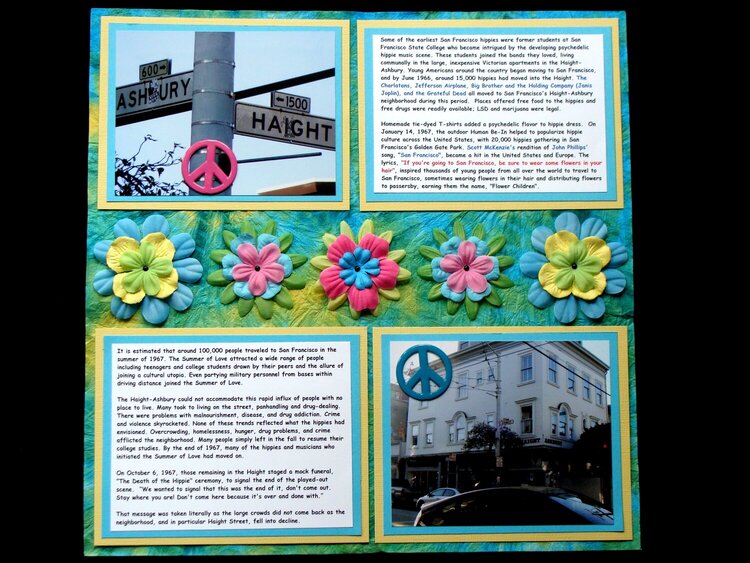

 Give a Cheer
Give a Cheer
Some of the earliest San Francisco hippies were former students at San Francisco State College who became intrigued by the developing psychedelic hippie music scene. These students joined the bands they loved, living communally in the large, inexpensive Victorian apartments in the Haight-Ashbury. Young Americans around the country began moving to San Francisco, and by June 1966, around 15,000 hippies had moved into the Haight. The Charlatans, Jefferson Airplane, Big Brother and the Holding Company (Janis Joplin), and the Grateful Dead all moved to San Francisco's Haight-Ashbury neighborhood during this period. Places offered free food to the hippies and free drugs were readily available; LSD and marijuana were legal.
Homemade tie-dyed T-shirts added a psychedelic flavor to hippie dress. On January 14, 1967, the outdoor Human Be-In helped to popularize hippie culture across the United States, with 20,000 hippies gathering in San Francisco's Golden Gate Park. Scott McKenzie's rendition of John Phillips' song, "San Francisco", became a hit in the United States and Europe. The lyrics, "If you're going to San Francisco, be sure to wear some flowers in your hair", inspired thousands of young people from all over the world to travel to San Francisco, sometimes wearing flowers in their hair and distributing flowers to passersby, earning them the name, "Flower Children".
-----
It is estimated that around 100,000 people traveled to San Francisco in the summer of 1967. The Summer of Love attracted a wide range of people including teenagers and college students drawn by their peers and the allure of joining a cultural utopia. Even partying military personnel from bases within driving distance joined the Summer of Love.
The Haight-Ashbury could not accommodate this rapid influx of people with no place to live. Many took to living on the street, panhandling and drug-dealing. There were problems with malnourishment, disease, and drug addiction. Crime and violence skyrocketed. None of these trends reflected what the hippies had envisioned. Overcrowding, homelessness, hunger, drug problems, and crime afflicted the neighborhood. Many people simply left in the fall to resume their college studies. By the end of 1967, many of the hippies and musicians who initiated the Summer of Love had moved on.
On October 6, 1967, those remaining in the Haight staged a mock funeral, "The Death of the Hippie" ceremony, to signal the end of the played-out scene. “We wanted to signal that this was the end of it, don't come out. Stay where you are! Don't come here because it's over and done with.”
That message was taken literally as the large crowds did not come back as the neighborhood, and in particular Haight Street, fell into decline.
No products have been added to this project.
Thanks for spreading positivity!
September 09, 2011
August 29, 2011
August 28, 2011
August 26, 2011
August 23, 2011
August 22, 2011
August 22, 2011
August 22, 2011
August 22, 2011
August 21, 2011
August 21, 2011
August 21, 2011
August 21, 2011
August 21, 2011
August 21, 2011